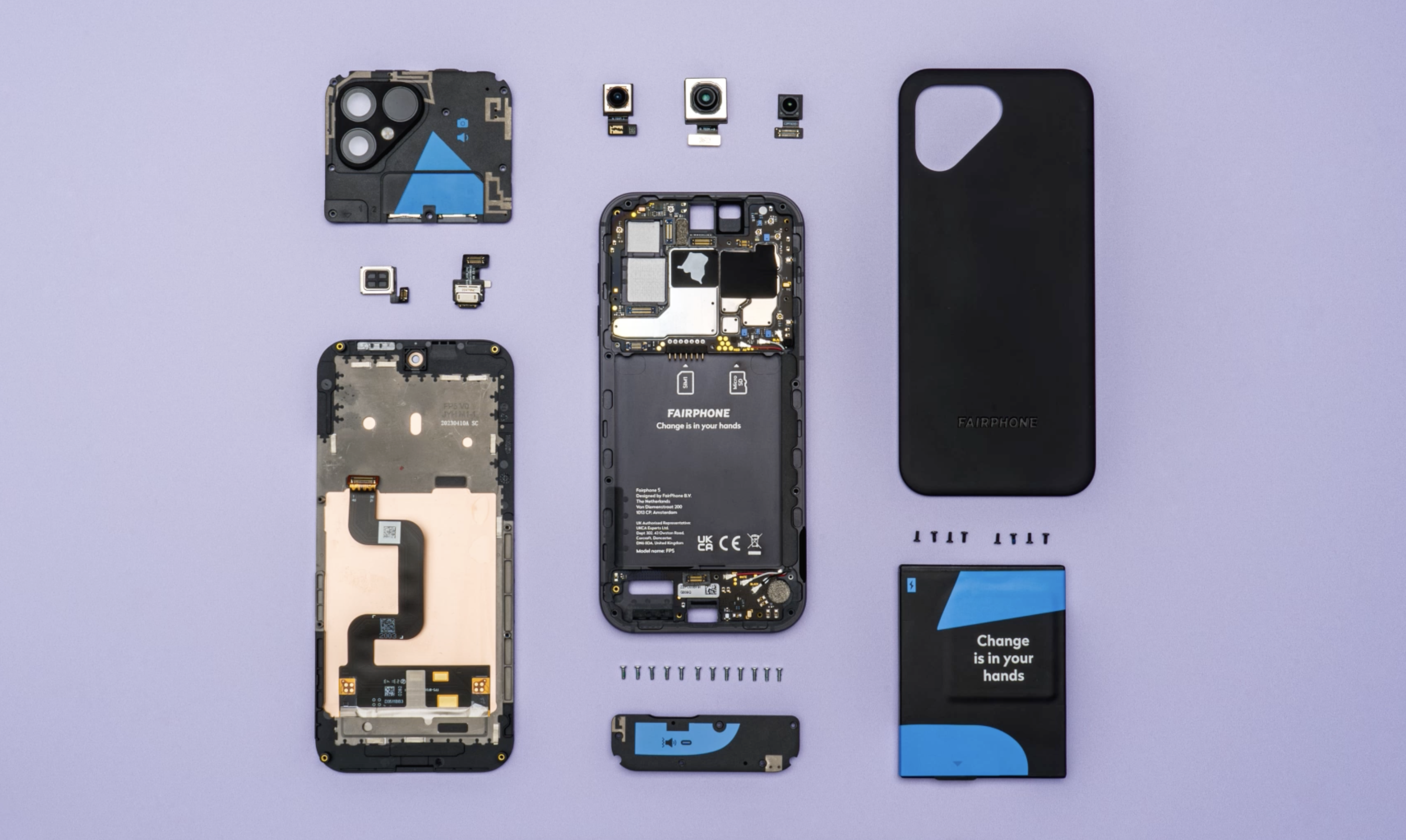Ethical electronics startup, Fairphone, has taken the recycled wrapping off a new flagship smartphone, the Fairphone 5, which will start shipping to buyers in Europe next month.
The Android 13-powered handset comes with a five year warranty and the promise of software support that it says will last until at least 2028 — and even as long as 2031 or 2033 — which suggests a buyer could, potentially, still be using the handset a decade later. (Or, well, assuming phones are still a thing by then and we’re not all plugged face-first into the metaverse.)
It’s the sequel to 2021’s Fairphone 4 — which was its first 5G device — so the Dutch social enterprise is keeping to a roughly two year release cycle for its smartphone line.
The sustainability-focused business defends releasing new hardware this often by saying electronics component manufacturing cycles essentially force it to keep refreshing its mobile hardware as the parts would simply not be available to sell the same device for five years. It also points out it continues to support most of its earlier handsets to promote device longevity. Producing new handsets is also about having an attractive enough proposition to acquire new Fairphone users by convincing consumers of rival smartphones to switch, it adds.
With the Fairphone 5, the B-Corp certified social enterprise is committing itself to 8 years of software support and 5 OS upgrades. But its goal is to be able to go further (to 2033) — although it says this will depend on factors like how many devices are still in use by then. So the firm promise is eight years support.
As with earlier Fairphones, buyers are also free to install an alternative OS — such as Murena’s deGoogled fork of Android, e/OS — so they don’t have to be locked into Google’s default mobile ecosystem.
Fairphone is anticipating being able to spin out software support for longer than it has before as a result of switching to a Qualcomm IoT chipset for this handset — which it notes has been designed for industrial grade hardware or devices with a longer lifetime. (The prior flagship ran with a more typical mid-range mobile choice of a Qualcomm Snapdragon 750G chipset.)
Commenting in a statement, Miquel Ballester, design lead at Fairphone, said: “With Fairphone 5, we are continuing to push the boundaries we pushed in the previous generations of Fairphones, showing the electronics industry what is possible. This time, we worked with Qualcomm Technologies to take the next step in our commitment to longevity by adopting an industrial grade chipset for the consumer market. We’re excited to be working with them to provide longer software support. This, as well as our unique five year warranty, will mean our users can be secure in the fact that we will keep their device going for as long as possible.”

As with Fairphone’s predecessor devices, the new flagship is modular — a design choice that intends to promote repairability to boost sustainability by empowering consumers to keep using the hardware for longer. Users can deconstruct the device and home, using a tiny screwdriver to switch out modules for repair or upgrade. Replacement parts are sold via Fairphone’s e-shop.
Fairphone also continues to incorporate recycled and fair mined materials into the construction of its devices. More than 70% of the materials fall into that category with the new flagship, per Fairphone — which it says is a significant jump on what it was able to offer for its prior flagship (just 30% at launch). It says it has been able to make particular strides in fair sourcing of cobalt, gold and silver for this device.
Another core focus for the social enterprise is working with suppliers to ensure workers involved in the manufacturing process of the device get a living wage. It suggests tens of thousands of workers involved in making its devices are also now being exposed to better working conditions as a result of agreements reached with suppliers, including the expansion of a living wage bonus which it was already providing via its direct supplier to three sub suppliers.
On the environmental side, it touts having convinced its assembly manufacturer to move to renewable energy to produce the Fairphone 5 through renewable energy credits as another big step forward — also with a commitment to move towards renewable energy production for the factory over the longer term.
It also continues to operate an e-waste reduction pledge whereby it commits to take back a phone for every one sold (or equivalent weight of e-waste). Add to that, it now also says it’s taking responsibility for the full CO2 footprint associated with its devices — firstly by avoiding emissions (through longevity and sustainability measures) but also by tackling any remaining emissions attached to the production and use of the device by investing in “gold standard CO2 reduction projects”.
Key device specs for the Fairphone 5 include a 6.46in OLED display (the first on a Fairphone), a Qualcomm Octa Core chipset, 256GB ROM and 8GB RAM, plus triple 50MP cameras with larger image sensors and improved tuning vs the Fairphone 4 (including for low light conditions). There’s also a slight boost to the IP rating for water and dust resistance.
The handset is available to pre-order from today, via Fairphone’s website and carrier partners, in a number of European markets including in the U.K., France, Germany and as an international/generic edition — with a release date of September 14 for most markets (devices sold in the Nordics will ship a few weeks later). RRP is €699.
While the Fairphone 4 is available in the U.S. via Murena, a Fairphone OS partner, the Dutch firm is still not committing to expanding its own sales operations into the U.S. — saying it plans to remain focused on Western Europe for now as it still sees plenty of scope for growth and brand development.
Fairphone gets its audio groove on with repairable over-ear BT headphones
Fairphone adds a 5G smartphone, touting software support until at least 2025































Comment